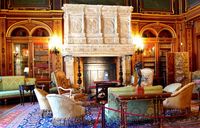Plutocrats: Are we living in a new Gilded Age?

The opulent library at a monumental mansion built by the Vanderbilt family at the height of the Gilded Age. Called The Breakers in Newport, Rhode Island, the home is now a National Historic Landmark.
The Gilded Age is the name Mark Twain and co-author Charles Dudley Warner gave to the period they satirized in their novel by the same name. The Gilded Age — the period after the Civil War up until 1900 — was a time of rapid industrialization and economic growth. This growth created the first class of super-rich, such as Andrew Carnegie, John D. Rockefeller, and J. P. Morgan, and ushered in record levels of economic inequality and grave social problems.
Are we in the Second Gilded Age?
Journalist Chrystia Freeland calls it a “Twin Gilded Age” in her new book, "Plutocrats: The Rise of the New Global Super-Rich and the Fall of Everyone Else." America and other advanced nations are experiencing their Second Gilded Age, a time when new technological revolutions and globalization are creating a new class of the ultra-rich along with record levels of economic inequality. These ultra-rich are the new plutocrats, she says, kin in spirit to the plutocrats of the first Gilded Age.
At the same time, the big emerging economies —Brazil, Russia, India, and China— are experiencing their first Gilded Age. These economies have produced their own plutocrats, the 1 percent and 0.1 percent who own and control most of their nation’s wealth. All these emerging economies have extremely high levels of inequality.
The Twin Gilded Age is the combination of the second one for advanced economies and the first one for emerging economies. The results are the same, says Freeland: “the bifurcation of the world in the rich—and the rest.”
Is this bifurcation good or bad? Some economists argue that inequality is necessary and beneficial because it encourages innovation and entrepreneurship.
Others argue that inequality impedes sustained economic growth because human capital is becoming more and more important. Greater inequality means more variation in access to education, with less investment in education for many people. Persistently high inequality can also lead to political unrest.
What do you think about the division of the world into "the rich and rest"?
Is inequality harmful or helpful?
Ultimately, does it come down to a question of what's morally right?
Wayne Baker is a sociologist on the faculty of the University of Michigan Ross School of Business. Baker blogs daily at Our Values and can be reached at ourvaluesproject@gmail.com or on Facebook.

